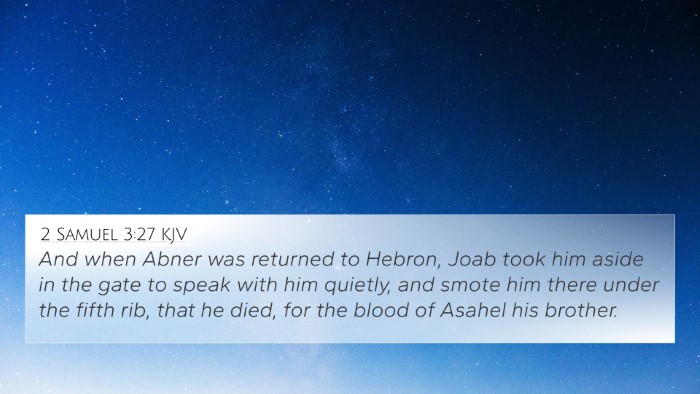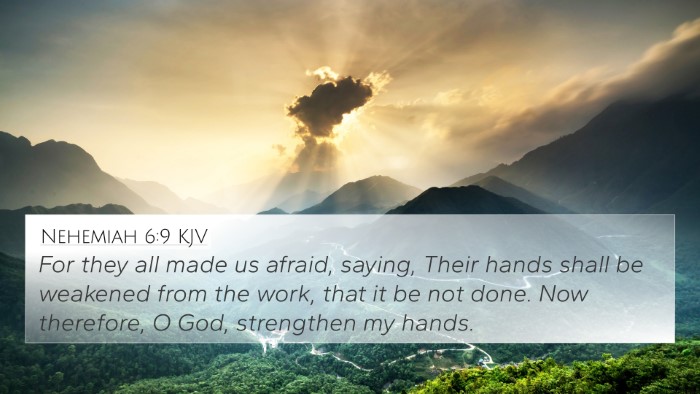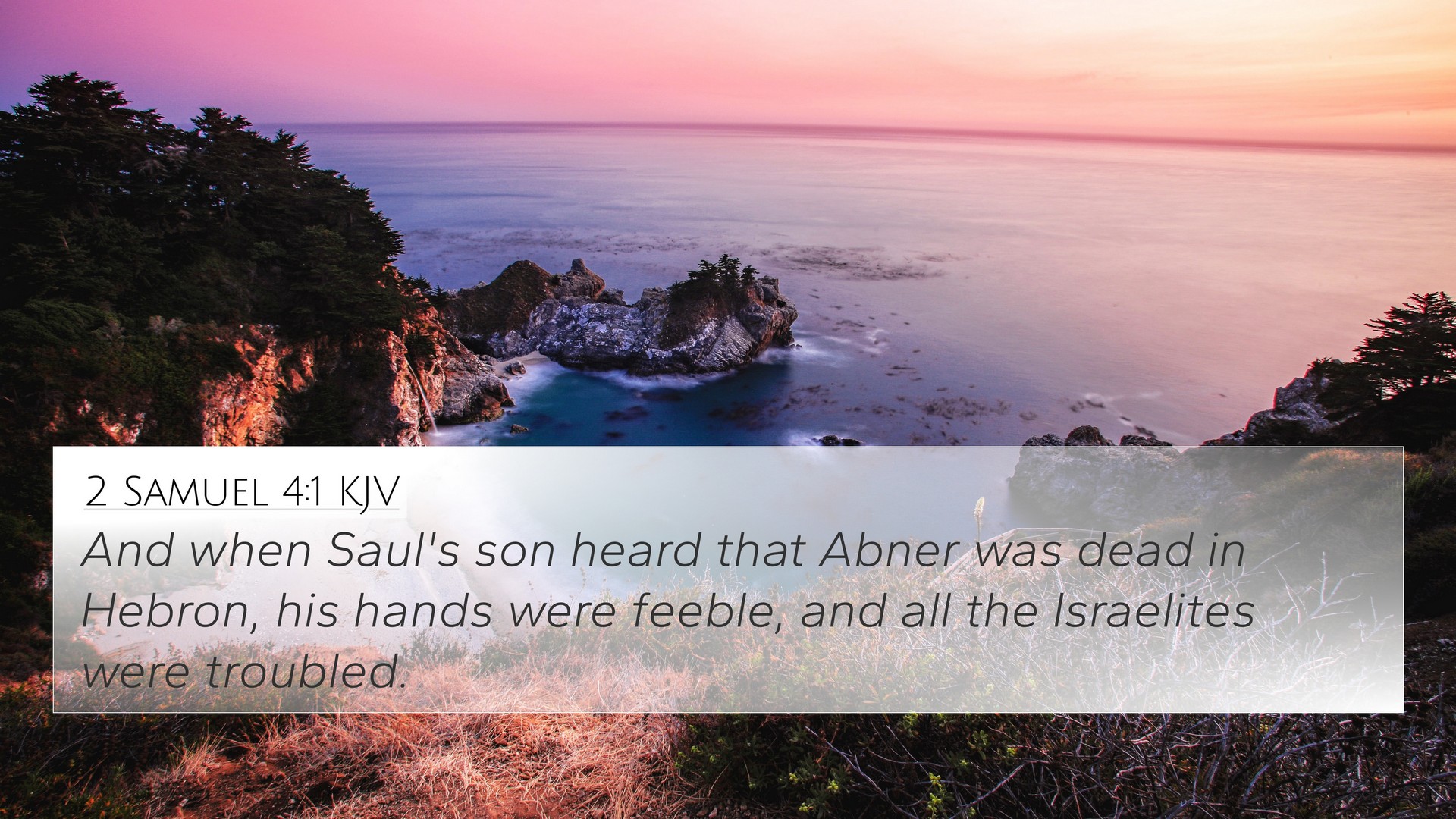Old Testament
Genesis Exodus Leviticus Numbers Deuteronomy Joshua Judges Ruth 1 Samuel 2 Samuel 1 Kings 2 Kings 1 Chronicles 2 Chronicles Ezra Nehemiah Esther Job Psalms Proverbs Ecclesiastes Song of Solomon Isaiah Jeremiah Lamentations Ezekiel Daniel Hosea Joel Amos Obadiah Jonah Micah Nahum Habakkuk Zephaniah Haggai Zechariah Malachi2 Samuel 4:1 Similar Verses
2 Samuel 4:1 Cross References
And when Saul's son heard that Abner was dead in Hebron, his hands were feeble, and all the Israelites were troubled.
Uncover the Rich Themes and Topics of This Bible Verse
Listed below are the Bible themes associated with 2 Samuel 4:1. We invite you to explore each theme to gain deeper insights into the Scriptures.
2 Samuel 4:1 Cross Reference Verses
This section features a detailed cross-reference designed to enrich your understanding of the Scriptures. Below, you will find carefully selected verses that echo the themes and teachings related to 2 Samuel 4:1 KJV. Click on any image to explore detailed analyses of related Bible verses and uncover deeper theological insights.

Ezra 4:4 (KJV) »
Then the people of the land weakened the hands of the people of Judah, and troubled them in building,

Jeremiah 6:24 (KJV) »
We have heard the fame thereof: our hands wax feeble: anguish hath taken hold of us, and pain, as of a woman in travail.

Zephaniah 3:16 (KJV) »
In that day it shall be said to Jerusalem, Fear thou not: and to Zion, Let not thine hands be slack.

Jeremiah 50:43 (KJV) »
The king of Babylon hath heard the report of them, and his hands waxed feeble: anguish took hold of him, and pangs as of a woman in travail.

2 Samuel 3:27 (KJV) »
And when Abner was returned to Hebron, Joab took him aside in the gate to speak with him quietly, and smote him there under the fifth rib, that he died, for the blood of Asahel his brother.

Nehemiah 6:9 (KJV) »
For they all made us afraid, saying, Their hands shall be weakened from the work, that it be not done. Now therefore, O God, strengthen my hands.

2 Samuel 17:2 (KJV) »
And I will come upon him while he is weary and weak handed, and will make him afraid: and all the people that are with him shall flee; and I will smite the king only:

Matthew 2:2 (KJV) »
Saying, Where is he that is born King of the Jews? for we have seen his star in the east, and are come to worship him.
2 Samuel 4:1 Verse Analysis and Similar Verses
Understanding 2 Samuel 4:1
Verse: 2 Samuel 4:1 - "When Ishbosheth, Saul's son, heard that Abner was dead in Hebron, his hands were feeble, and all the Israelites were troubled."
Summary and Commentary Insights
The verse captures a pivotal moment in the political landscape following the death of King Saul. Ishbosheth, Saul's son, is left vulnerable after the loss of his commander Abner. This reflects both his physical and emotional state, representing the wider turmoil among the Israelites.
Context of the Verse
The death of Abner, a significant figure for Ishbosheth and Israel, marked a turning point in the struggle for kingship. As Matthew Henry notes, Abner was the one who upheld Ishbosheth’s position. Without Abner, Ishbosheth's rule appeared precarious, indicating the fragility of leadership founded on fear rather than loyalty.
Key Themes
- Instability in Leadership: The panic of the Israelites symbolizes a broader issue of governance.
- Fear and Weakness: Ishbosheth's ‘feeble hands’ may suggest both literal weakness and a lack of resolve.
- Human Dependency: This scenario illustrates how leaders often rely heavily on their commanders or advisors for stability.
Bible Verse Cross-References
Understanding this verse deepens with its connections to other scriptures:
- 1 Samuel 31:1-6: A reflection on Saul’s death and its implications on his heirs.
- 2 Samuel 3:30: The account of Abner's death and its repercussions.
- 1 Chronicles 10:13-14: Commentary on Saul’s demise due to his disobedience.
- Proverbs 28:2: Insights on the effect of transgressions on leadership and governance.
- Matthew 27:5: Judas's remorse parallels the betrayal and instability following a leader's death.
- Acts 20:30: The threat of internal strife within the body, similar to the struggles observed in Israel.
- Philippians 1:27: Encouragement for remaining steadfast, relevant during times of distress like Ishbosheth faced.
Comparative Bible Verse Analysis
By engaging in cross-referencing Biblical texts, one can draw insightful parallels:
- Just as Ishbosheth was troubled after Abner's demise, Psalm 12:1 reflects on the need for faithful leaders when the faithful fail.
- Ishbosheth's fear mirrors that of the disciples in John 20:19, who feared after Christ's crucifixion.
Thematic Connections
This verse encapsulates themes of:
- Panic in Leadership: Leadership crises often arise out of the loss of key figures.
- The Fragility of Power: Ishbosheth's emotional state underscores how power can be transient and reliant upon the support of others.
- Human Vulnerability: The response of people to leadership change often reflects their own sense of security.
Conclusion
In conclusion, 2 Samuel 4:1 serves as a sobering reminder of the complexities of leadership amid political strife. The discomfort of Ishbosheth and his people resonates with lessons on fear, dependency, and the overarching effects of a leader's support system. By exploring this verse through cross-references and thematic connections, one can gain a more profound understanding of its significance in Biblical narrative and history.
Guidance for Further Study
For those interested in exploring connections between Bible verses and deeper themes, utilizing a Bible concordance or cross-reference guide can be incredibly beneficial. Such tools allow one to:
- Identify connections between Old and New Testament themes.
- Access detailed comparative studies of key figures and their impacts.
- Engage in cross-referencing Bible study methods that enhance scriptural understanding.
- Compile extensive links for sermon preparation and thematic analysis.




